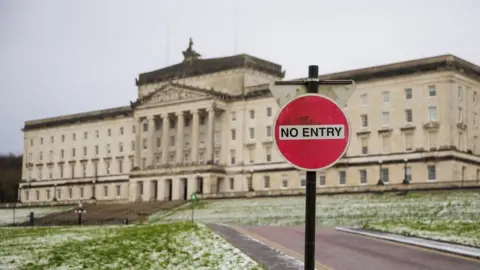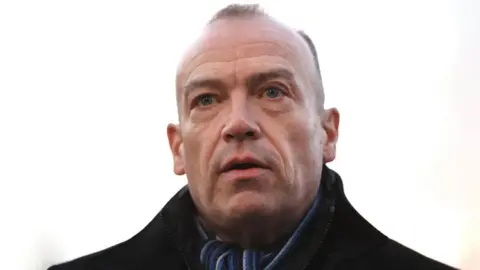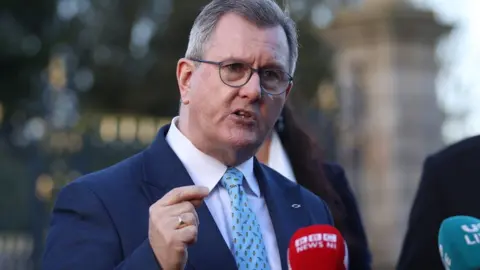Stormont stalemate: Deadline to restore Northern Ireland Executive to expire
 Liam McBurney
Liam McBurneyThe latest legal deadline for restoring Stormont's power-sharing government is due to expire at midnight.
If no executive is formed by 23:59 GMT, the Northern Ireland secretary falls under a legal duty to call an early assembly election.
But Chris Heaton-Harris has pushed back this deadline several times before and has indicated he will do so again.
He said he intends to bring forward legislation "on these matters" next week.
The deadline coincides with a mass strike in Northern Ireland involving more than 100,000 public sector workers in a dispute over pay and conditions.
Northern Ireland's devolved government collapsed in February 2022 after the Democratic Unionist Party (DUP) withdrew in protest against post-Brexit trade checks between the region and Great Britain.
It believes the arrangements under the Northern Ireland Protocol diminish the region's place within the UK internal market.
A new deal called the Windsor Framework was agreed in 2023 between the government and European Union aimed at addressing concerns.
But the DUP said this did not go far enough, and for months the party has been in talks with the government seeking further changes.
In December, the Northern Ireland secretary said those talks had "effectively concluded".
Mr Heaton-Harris also offered a £3.3bn financial package for Northern Ireland including funds to settle public sector pay claims - but it is contingent on the Stormont institutions being restored.
 Liam McBurney
Liam McBurneyThe Northern Ireland secretary has come under pressure from local parties and trade unions to tackle the pay dispute in the absence of an executive, but he has argued it is a matter for local ministers to address.
DUP leader Sir Jeffrey Donaldson has called for a better financial package.
On Wednesday, the assembly was recalled in a seventh attempt to restore devolved government since elections were last held in May 2022.
But the DUP again vetoed the election of an assembly speaker, meaning no other business could take place.
If an executive is not re-established, the secretary of state is set to be involved for a second consecutive year in setting Stormont's budget.
Last year, he set a budget for Stormont in the absence of local ministers, leaving unelected civil servants with the task of making substantial cuts.

Analysis by BBC News NI Political Editor Enda McClafferty
Chris Heaton-Harris again alluded to setting out a pragmatic approach to the governance of Northern Ireland in the coming days.
We know that he's planning to bring forward legislation next week which will extend the legal deadline he had to call an assembly election - it expires at midnight.
We understand he will push that back, perhaps by up to a year or so, and then there's the arguably more pressing piece of legislation which is the Budget Bill for Northern Ireland.
The head of the Civil Service in Northern Ireland has made it very clear that this needs to enacted by March.
Apparently he told the parties that there could be a hybrid government whereby he will be able to reach in and make decisions that can't be made by permanent sectaries who are currently running Northern Ireland.
But him having the power to do that and actually doing that are two very different things.

Mr Heaton-Harris said it was regrettable that Stormont power-sharing had not been restored.
"The people of Northern Ireland deserve local political leadership from representatives they have elected to govern on their behalf," he said in a statement.
 Liam McBurney
Liam McBurneyIn the Commons on Wednesday, Mr Heaton-Harris addressed the upcoming deadline.
He told MPs: "I will need to bring in primary legislation because a duty does fall on me to call an election for the Northern Ireland Assembly.
"I have a number of weeks, I think 12 weeks, in which to do that.
"And I intend to bring in legislation on these matters next week."
In the last assembly election in May 2022, Sinn Féin became the largest party at Stormont for the first time, pushing the DUP into second place.
But Stormont's structures for power-sharing between unionists and nationalists mean an executive cannot be restored without the support of both parties.
 Pacemaker
PacemakerOn Thursday, Sinn Féin vice-president Michelle O'Neill said her only explanation for the DUP not returning to the executive was "their refusal to accept a nationalist first minister".
"They have told us on many occasions that's not the case, however, the evidence speaks loudly that that is in fact the case," she continued.
Speaking to BBC's Good Morning Ulster, Ms O'Neill said she still believed in power-sharing and would not give up on it.
"I still call on the DUP even at this juncture to join with us and I won't give up on that," she said.
Taoiseach (Irish prime minister) Leo Varadkar has previously called for a "plan B" if the Stormont institutions are not restored.
The original legal deadline for forming an executive was 28 October 2022.
In the lead-up to the date, Mr Heaton-Harris insisted he would call an election if no executive was formed.
But he later brought forward emergency legislation via Westminster to extend the deadline, and then further pushed the date back once again to 18 January 2024.